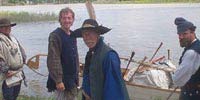Lewis & Clark: Re-enactors- Missouri Breaks

 3:42
Barrett Golding
3:42
Barrett Golding
Re-creating the epic expedition in rowboats.
Broadcast: May 31 2004 on NPR Day to DaySeries: Lewis & Clark Trail: 200 Years Later Subjects: Historical, Travel
Profile: Re-enactment of Lewis and Clark's expedition
May 31, 2004 from Day to Day
MADELEINE BRAND, host: This is DAY TO DAY from NPR News. I'm Madeleine Brand.
Two hundred years ago this month Lewis and Clark began their expedition west to the Pacific. Much of their trail along the Missouri and Columbia rivers has changed quite a bit in the past two centuries, but there are some spots that look much the same. You half expect to see a wooden boat full of men with buckskin and black-powder rifles. Well, that's exactly what producer Barrett Golding observed when he was kayaking the Missouri breaks.
(Soundbite of water)
Mr. BARRETT GOLDING (Producer): These are the re-enactors coming in.
Unidentified Man #1: Paddle! Paddle! Come on, harder! Paddle, paddle.
Unidentified Man #2: Whoo-haw.
Unidentified Man #3: OK, hold it. We're here.
Unidentified Man #4: Out. Docking.
(Soundbite of laughter)
Mr. GOLDING: ...go over the side. Don't step off of there.
Unidentified Man #5: Oh, who did that?
Unidentified Man #6: Go forward.
Unidentified Man #7: I'm over.
Mr. JAN COTTINGHAM: We've been on the Flambeau River in Wisconsin and Lake Superior up to Ft. William, and we've been down through here four or five times in the last 12, 13 years. We can go French and Indian War, and everybody's kind of Lewis and Clark right now. I've got handmade wool stockings, handmade linen pants here, a little quill work on a tobacco pouch. All of our food is primitive: jerky, smoked bacon, lyed corn, which most people call hominy. Flint and steel fires, no matches. And we have a rum box that we carry our shrub in. It's a Hudson Bay mix shrub. And for the guys who are on the rivers in Canada, the voyageurs, they wanted their rum ration every day, but they wouldn't eat any vegetables and stuff that would keep them from getting scurvy. So what they'd do is they would mix the rum with muscavado sugar, which is like a real dark brown molasses sugar, and then they'd put lime juice in it. So when the guys got their ration of rum, they got their lime juice, too. That way they wouldn't get scurvy.
Unidentified Man #8: You've got to talk to the captain.
Mr. COTTINGHAM: But it's just fun. Just--you make all this stuff. And you go out and test your gear and test your skills with the gear, the stuff that they would have used, you know, like this knife I'm carrying. This knife is modern-made in Sheffield, England. This same knife has been in continuous production for over 225 years. Fishermen use it today, commercial fishermen. They take it to the Amazon and to trading stores, and the Amazonian Indians are using this. They use them in Africa, use them all over the world. And they were using them here when this was the frontier. And Ft. Union just down here and Ft. Benton, this is one of the knives that they sold, you know. So, you know, people like American history, well, this is it. You've got to rough it a little bit. You've got to be willing to be in the mud and the dirt a little bit, you know.
Unidentified Man #9: It'd be nice to have a little rain to cool things off.
Mr. COTTINGHAM: You like to create in your mind--romanticize about it, you know. And we do that. People look back and think that it might be better. But every generation thinks that about a couple generations back or so, and it's a lie. They had as much government regulation on these rivers and permits and stuff as they do today. I mean, you know, so politics was just as dirty. You couldn't haul liquor up to the Indians, and they actually had, you know, people checking to make sure you didn't have liquor. And so we think a lot of things we do are so new, and it's really not, except the technology, you know. As far as human beings, we've been the same for 100,000 years, you know--a hundred and some thousand.
Unidentified Man #10: There you go. Humans are humans.
Unidentified Man #11: Uh-oh. What do you mean?
Unidentified Man #12: Up. Up. up.
BRAND: Jan Cottingham played the captain in this re-enacted expedition. The story was produced by Barrett Golding of Hearing Voices.

